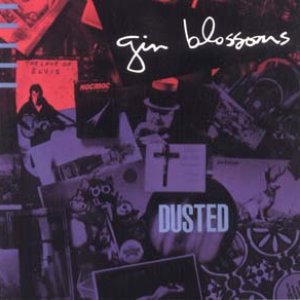Published on Oct 10, 2002
Sometimes before you can move forward, you first need to look
back. It’s true in life; it’s true in music. Personally, I admire
the fact the when Tempe, Arizona’s long-gone favorite sons the Gin
Blossoms re-grouped this year, they didn’t rush a new album out.
There were practical reasons, of course – five years of rust as a
musical unit and no record deal, for a couple of big ones.
But still, as a fan it’s nice to have the guys spend a little
time reminding us why we missed them and learning to play together
again before tackling the challenges of a new studio album. This
month saw the re-release of not one but two Blossoms
oldies-but-goodies. Second in line was the 10th anniversary deluxe
edition of the magnificent
New Miserable Experience, the subject of next Thursday’s
review. First, though, came the re-release of this little diamond
in the rough – the Blossoms’ first full-length indie record, dating
all the way back to the band’s club days in 1989.
Dusted is rough around the edges in all the ways you might
expect. The production is almost non-existent, as if this was
pretty much a plug-in-and-play live performance. Compared to the
band’s later, trademark rich twin-guitar sound, this album’s
guitars sound soft and/or tinny, the drums muffled, the vocals
slightly distant, like the guys were standing a few feet away from
their mics, still midstream in the process of figuring how to
attack these songs.
Do-it-yourself albums are usually like that; the songs really
have to stand or fall on pure musical merit rather than
professional production values. Not surprisingly – remember, this
is the disc that got the band signed in the first place – they do.
The band – Robin Wilson on lead vocals, Jesse Valenzuela on guitar
and harmony vocals, Bill Leen on bass, Phil Rhodes on drums and
Doug Hopkins on guitar — was still learning, but the
bursting-at-the-seams talent present in the room is obvious.
One of the amazing things to hear is the difference in the songs
that two years later made it onto
New Miserable Experience. “Lost Horizons,” “Found Out About
You” and “Hey Jealousy,” three of the band’s strongest tracks, were
all recorded at considerably faster tempos here. (As the band’s
manager said recently on their e-mail list “Yes, they really did
play everything that fast. The tape speed isn’t wrong.”) You’re
left to speculate on why. Was Hopkins, the tortured musical prodigy
who wrote all three songs before alcoholism and depression sent him
spiraling out of the band, having a hard time letting the
desperately melancholy lyrics stand on their own? Did it take
NME producer John Hampton’s influence for the band to
realize the songs have more emotional impact played at a more
deliberate pace? Or were they just young and impatient?
Other intriguing artifacts on this album include first takes on
the Gram Parsons-ish country-rock ballad “Angels Tonight,” the wry
Wilson rocker “Idiot Summer” and Hopkins’ tongue-in-cheek porn-star
tribute “Keli Richards,” all staples of the band’s early live
shows.
The reamining tracks catalogue both the Blossoms’ prodigious
musical abilities and their still-present learning curve. One-time
lead singer Valenzuela takes the mic for three tracks (“Something
Wrong,” “I Can Sleep” and “Fireworks”), all high-energy, melodic
rock numbers that deserve consideration for re-recording, but also
each a strong argument for Robin Wilson as the band’s lead
vocalist. Valenzuela is an excellent writer and guitar player, but
his gentle, smoky voice is better suited to harmonies and ballads
than taking the lead on heavy rock songs.
The positive aspect of the garage-band production is that it
strips the songs down to their musical core. In its major-label
days, the richness of the band’s twin-guitar attack tended to
obscure their roots and influences. I remember reading about
jangle-rock progenitors the Byrds’ tremendous influence on the
Blossoms and straining to hear it through the turbo-charged guitar
leads. But with
Dusted‘s stripped-down sound, it’s impossible to listen to
songs like “Something Wrong” without thinking “So that’s what
Marshall Crenshaw and the Byrds would sound like together.”
Any Blossoms fan is going to want to own this album both for
strong rarities like “Slave Dealer’s Daughter” and to hear the
original versions of classic Blossoms cuts like “Hey Jealousy.” For
everyone else, production values aside, this album – available via
the Benchmark Records
Web
site, as well as CDNOW– stands up well as a historical
milestone in the still-unfolding career of a great band.
